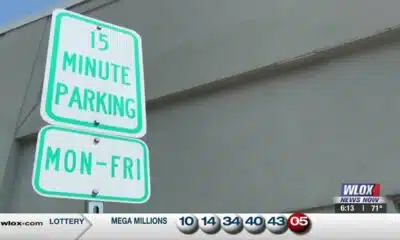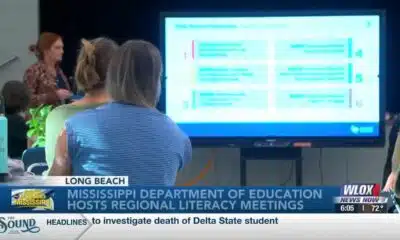News from the South - Texas News Feed
Texas Wildfire: Crabapple fire now 40% contained, 9,500 acres burned
SUMMARY: The Crabapple wildfire in Gillespie County, Texas, is now 40% contained, having burned approximately 9,500 acres. Residents near the fire, which has been exacerbated by dry conditions and high winds, are urged to evacuate. Shelter is available at Zion Lutheran Church in Fredericksburg for evacuees. Although conditions have improved slightly, critical fire weather is expected to continue, with increased winds predicted for the coming days. Governor Abbott announced FEMA’s approval for financial assistance to help cover firefighting costs, with eligible reimbursements of up to 75%. Fire crews are focusing on creating containment lines and addressing hot spots.
Crews have made progress in containing the spread of the Crabapple fire in Gillespie County on Sunday. The bad news is conditions are about to get worse for those working to stop the fire’s spread.
#FOX7Austin brings you the important stuff like breaking news, weather, and local stories out of Central #Texas. But also plenty of fun stuff, like Pet of the Weekend, the best of our archives, and all those ‘only-in-#Austin’ stories.
Subscribe to FOX 7 Austin: https://www.youtube.com/myFOXaustin
Download the FOX 7 Austin News app: http://bit.ly/3sNGN7a
Subscribe to the FOX 7 Austin newsletter: https://bit.ly/2Th6U9Y
More from FOX 7 Austin: https://www.fox7austin.com/
Got a news tip? Call us at 512-472-0988 or email us: ktbcnews@fox.com
News from the South - Texas News Feed
Frustrated with poor play against UTEP, Arch Manning will 'get back to basics'
SUMMARY: Texas quarterback Arch Manning and coach Steve Sarkisian acknowledge the team’s underwhelming offensive performance in a 27-10 win over UTEP. Manning completed 11 of 25 passes for 114 yards with a touchdown and an interception, frustrating fans expecting a stronger showing at home. Despite a rough first half with 10 consecutive incompletions, Manning showed flashes of promise and scored twice on the ground. Sarkisian emphasized Manning’s mental struggle rather than physical injury and expressed confidence in his growth and consistency. Manning committed to improving fundamentals and handling in-game pressure ahead of tougher matchups, including their SEC opener against Florida on Oct. 4.
The post Frustrated with poor play against UTEP, Arch Manning will 'get back to basics' appeared first on www.kxan.com
News from the South - Texas News Feed
Texas nursing students return from life-changing internship in Africa
SUMMARY: Two Texas nursing students, Tom Strandwitz and Valerie Moon, participated in Mercy Ships’ inaugural nursing internship aboard the Africa Mercy hospital ship in Madagascar. Selected from nationwide applicants, they gained hands-on experience in various departments, providing free surgeries and care in underserved regions. Their travel expenses were covered by over $11,000 raised through community GoFundMe campaigns. Both students were deeply impacted by patient interactions, such as cataract surgeries restoring sight and building trust with families. The internship broadened their perspectives on global health care. They plan to continue careers in intensive care and public health, with hopes to return to international nursing missions.
Read the full article
The post Texas nursing students return from life-changing internship in Africa appeared first on www.kxan.com
News from the South - Texas News Feed
Austin becoming FEMA-approved emergency alert authority, planning 1st test alert
SUMMARY: On Monday, Sept. 29, Austin will conduct a test of the Integrated Public Alert and Warning System (IPAWS), becoming a FEMA-approved alerting authority able to send emergency alerts via Wireless Emergency Alerts (WEA) to cell phones and Emergency Alert System (EAS) messages to TV and radio. This coordinated test at 3 p.m. will cover the city across its three counties—Travis, Hays, and Williamson. The alerts will clearly indicate a test and require no action. IPAWS allows authenticated, geotargeted emergency notifications without subscription, enhancing public safety communication. More details are available at ReadyCentralTexas.org and Ready.gov/alerts.
The post Austin becoming FEMA-approved emergency alert authority, planning 1st test alert appeared first on www.kxan.com
-
News from the South - North Carolina News Feed6 days ago
What we know about Charlie Kirk shooting suspect, how he was caught
-
Local News7 days ago
Russian drone incursion in Poland prompts NATO leaders to take stock of bigger threats
-
Local News Video7 days ago
Introducing our WXXV Student Athlete of the Week, St. Patrick’s Parker Talley!
-
News from the South - North Carolina News Feed6 days ago
Federal hate crime charge sought in Charlotte stabbing | North Carolina
-
The Center Square7 days ago
Weapon recovered as manhunt continues in Kirk assassination investigation | National
-
Our Mississippi Home5 days ago
Screech Owls – Small but Cute
-
News from the South - Tennessee News Feed7 days ago
Middle Tennessee State University dean filed over Kirk comments | Tennessee
-
News from the South - Arkansas News Feed6 days ago
NW Arkansas Championship expected to bring money to Rogers











































